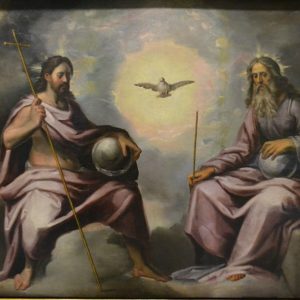If Protestants held every book of the Bible to the standards that they hold the books that they reject, they would end up missing a huge number of their books. And conversely, if they approach the Deuterocanon with the same charitable reading with which they approach (say) Judges, there would be no reason not to include it as part of the Scriptures. We can see that clearly by looking at 5 alleged “Biblical contradictions” in the Deuterocanon.
Tag: Bible
What if the Protestant Interpretation of John 6 is Correct?
Let’s talk about the Bread of Life discourse in John 6:22-70. The Catholic interpretation makes sense, but it’s a shocking one. We think that this lengthy passage is about the Eucharist, and that Jesus Christ literally means that we eat His Flesh and drink His Blood in Communion. This teaching, radical to twenty first-century ears, was no less radical to first-century ears, and even many of Jesus’ own disciples stopped following Him upon hearing it.
Protestants typically disagree with this interpretation, arguing that Jesus’ commands that we should eat His Flesh and drink His Blood are just metaphors. Often, both sides are so busy debating the credibility of the Catholic interpretation that neither stop to seriously ask, “Does the Protestant interpretation make any sense?” The obvious question is if Jesus is speaking metaphorically, what’s it a metaphor for? What is Jesus actually saying?
The Trouble with Jerome
Protestants frequently claim that there are only 66 books in the Bible. This isn’t the Bible used by early Christians, by Luther, by Calvin, or by the Catholic, Orthodox, or Coptic Churches. So where do they draw support? Strangely, they cite a single fourth century Church Father: St. Jerome. But there’s a problem with that approach. Or more accurately: four problems.
66 Love Letters? How to Think of God’s Revelation
Certain Protestants have taken to referring to the Scriptures as “66 love letters.” That gets something fundamentally right about God’s revelation, but goes wrong in three ways.
Wait for the Lord: Learning from Judith, Anna and Simeon
In the face of a political and personal future that often seems uncertain or unpleasant, it’s easy to lose heart and to despair of God’s presence in our lives. Fortunately, Scripture presents a radically different message. Here’s what Judith, Simeon and Anna have to show us about aligning our lives to God’s timetable, instead of trusting in secular salvation.
Why Mary is Our Mother in Faith
Just as the Bible presents Abraham as our father in faith for his radical willingness to trust God, we’re also given a mother in faith: the Virgin Mary. Listen to what Scripture says about her role in following God from the Annunciation to Calvary and into glory.
Why Abraham is Our Father in Faith
Why is Abraham our father in faith? Because of his primacy and because of his intensity – an intensity we see most clearly in the shocking account of the Sacrifice of Isaac.
Did Jesus Believe in God?
Did Jesus believe in God? The answer might surprise you. Here’s the Biblical case *against* Jesus Christ having faith.
The Incomprehensible Love of the Holy Trinity
This Sunday is Trinity Sunday. Do you know what’s a good analogy for the Trinity? Nothing. God is so far beyond our ability to comprehend Him, much less to express His inner nature in human speech, that all of our attempts to do so fall miserably short. Worse, it’s easy to fall into heresy and idolatry. But these are no excuses for ignoring the life-changing reality of the Holy Trinity.
A Protestant Case for the Queenship of Mary
Can the Queenship of the Blessed Virgin Mary be established using Scripture alone, without appealing to Catholic Tradition, the writings of the Church Fathers, or later Church statements?









